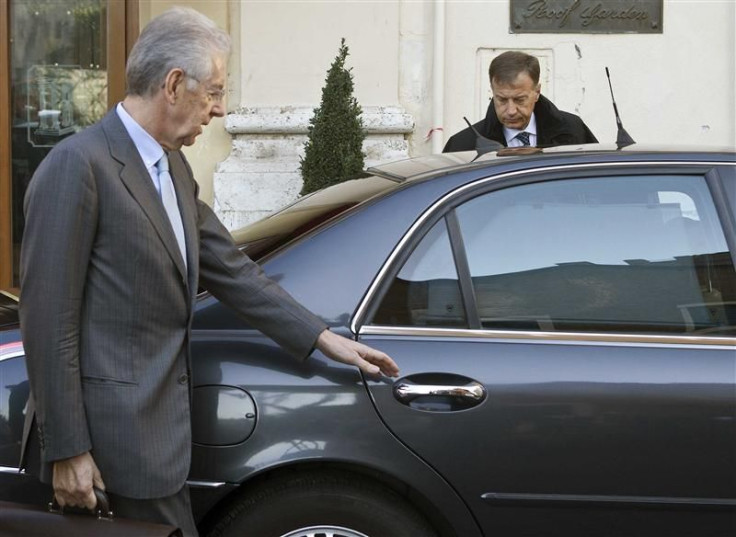Italy's Monti to Discuss 'Sacrifices' With Parties

Prime Minister-designate Mario Monti meets the leaders of Italy's biggest two parties on Tuesday to discuss the many sacrifices needed to reverse a collapse in market confidence that is driving an ever deepening euro zone debt crisis.
Global equity markets and the euro slid Monday on doubts Monti and Greece's new leader would take the tough steps needed, and a report said the situation in triple-A rated euro zone power France should be ringing euro zone alarm bells.
Greece's new technocrat Prime Minister Lucas Papademos said late Monday that Greece had no choice but to remain inside the euro zone, telling lawmakers reforms were the only way to mitigate painful austerity measures which had deepened the recession.
But conservatives on whom he must rely for support demanded pro-growth policies and rejected talk of further austerity measures, fueling fears of a Greek default that may force Athens out of the 17-nation euro currency group and trigger a euro zone debt meltdown.
German Chancellor Angela Merkel caught the mood of crisis with a stark warning Monday that Europe could be living through its toughest hour since World War Two. She told her CDU party she feared Europe would fail if the euro failed and vowed to do anything to stop this from happening.
Monti will pursue his efforts Tuesday to secure enough support from Italy's feuding politicians to allow his cabinet of experts to speed up delivery of painful reforms of pensions, labor markets and business regulation needed to put Italy's finances on a sustainable footing.
Italy has to refinance some 200 billion euros ($273 billion) of bonds by the end of April, a daunting prospect given it was forced Monday to pay a euro-lifetime record yield of 6.3 percent to sell five-year bonds to wary investors.
The auction, and the release of figures showing industrial production slumped by 2 percent in the euro zone in September, raised the spectre of recession and provided a gloomy backdrop to Monti's consultations with the heads of smaller parties.
Monti spoke about a significant program with many sacrifices, Francesco Nucara, a lawmaker from one of the myriad tiny parliamentary groups involved in the talks, said after meeting the prime minister-designate.
Monti, a respected former European commissioner, was due Tuesday to meet leaders of the two largest parties of the center-right and the center-left, unions, and representatives of women and youth groups.
Monti, who is expected to seek a confidence vote by Friday, told a news conference that he aimed to serve until scheduled elections in 2013, not just until reforms had been pushed through.
Far-reaching reforms are seen as crucial if Italy is to end years of stagnant growth, trim a debt mountain equal to 120 percent of gross domestic product and avoid the sort of crisis that forced bailouts of Greece, Ireland and Portugal.
With the very survival of the 17-state currency zone in its current form now at risk, EU governments have until a summit on December 9 to come up with the outlines of a bolder and more convincing strategy, with some form of massive, visible financial backing.
Prospects are uncertain as the German government, the Bundesbank and hardliners in the European Central Bank have blocked key policy options.
These include issuing common euro zone bonds, mutualising the euro zone's debt stock, letting the ECB create money to fight the crisis, or having it act as lender of last resort, directly or via the euro zone rescue fund.
The urgency of resolving the persistent crisis was underscored by a report by the Lisbon Council, which said France's inability to make rapid adjustments to its economy was a serious concern and should be of acute concern for the euro zone.
Among the six euro zone countries with a AAA rating, France achieves by far the lowest ranking in the study's fundamental health check, the Brussels-based think-tank found in the 75-page report, called the Euro Plus Monitor.
The results are too mediocre for a country that wants to safeguard its place in the top league... Alarm bells should be ringing for France.
RIGHT SAYS NO MORE CUTS
In Greece, incoming premier Lucas Papademos, who must win a confidence vote Wednesday before meeting euro zone finance ministers in Brussels Thursday, told lawmakers that Greece had no option but to remain within the euro zone.
Austerity measures had deepened Greece's recession but reforms -- including widening the tax base and fighting rampant tax evasion -- could mitigate the problem, said Papademos, who oversaw Greece's entry to the euro zone in 2002.
But New Democracy leader Antonis Samaras said he would not vote for new austerity measures. Spending cuts and tax rises agreed with foreign lenders should be changed in favor of economic growth.
I agree with the goals to cut government spending ... to reduce debt, to erase the deficit, to make structural changes. I do not agree with whatever stunts growth, he told party MPs.
Inspectors for Greece's international lenders, known as the troika, were due to meet Papademos's administration after the confidence vote, but an EU official said the visit might not happened until the end of the week.
Most Greeks hailed Papademos's appointment, but thousands of people angry at more than a year of austerity are expected to rally Thursday, the anniversary of a 1973 student uprising that helped to bring down a 1967-1974 military junta.
(Additional reporting by Luke Baker in Brussels; Writing by Jon Boyle; Editing by Michael Roddy)
© Copyright Thomson Reuters 2024. All rights reserved.











